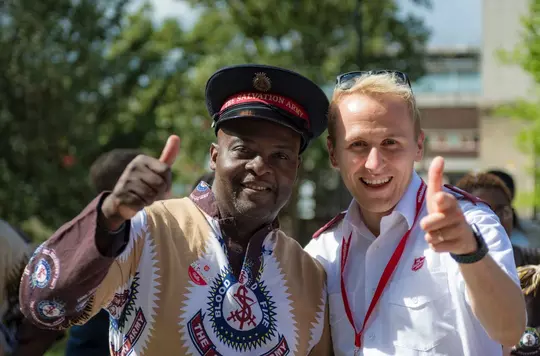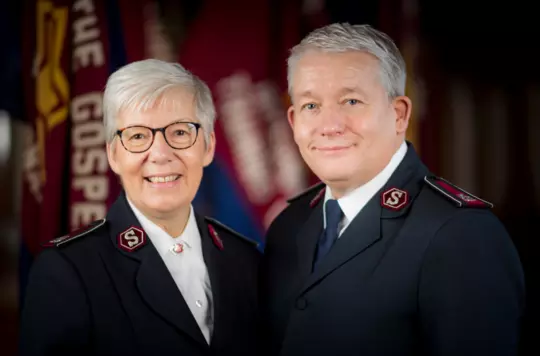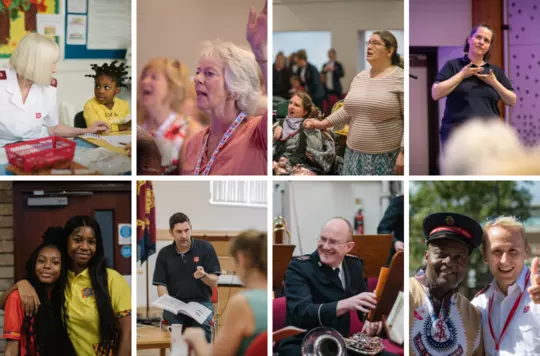2 March 2024
Belonging and Believing: Human sexuality
Colonel Julie Forrest

Colonel Julie Forrest talks to Salvationist about her session at Belonging and Believing: The Big Conversation on the 2022 International Symposium on Human Sexuality.
In 2022, delegates from across the international Salvation Army met in Singapore for a week-long symposium on human sexuality. They explored what it means to be a child of God, identity in Christ, living with difference, constructing an understanding of faith and sexuality, same-sex attraction/same-sex relationships, pornography, married life, how to live faithfully in all relationships and how to include those who do not feel included. As international liaison officer for dialogue on human sexuality, Colonel Julie Forrest led the symposium, supported by the International Moral and Social Issues Council and the International Theological Council.
As part of Belonging and Believing: The Big Conversation this weekend, Colonel Julie is sharing some thoughts on the symposium.
What are you presenting at the weekend?
As well as being the territorial secretary for leader development, I am still the international liaison officer for dialogue on human sexuality. In that capacity, I’ll be giving an hour’s presentation on the symposium. This is just a snippet of a nuanced seven-day symposium.
How does this fit into the conversation around belonging and believing?
One of the symposium’s goals was to reflect on inclusion, and how we embrace those who consider themselves to be on our margins because of their human sexuality or behaviour. The symposium was focused on sexual behaviour and sexual relationships. But when I think about inclusion, for me it’s also about, for example, disability, race, mental health, any kind of social interaction difficulties. It’s about making our worship as inclusive as possible.
I read a line in a book a long time ago that suggested we pray ‘God break my heart with the things that break yours’. In doing so, God reminds me of people who feel less because of something they have done, or had done to them, in their sexual behaviour or in owning their sexual identity. One of the starting points at the symposium was considering scenarios of how accepted people feel they are. One comment that came out of that was to remember that we don’t need to take Jesus to the margins: he is already there. Jesus is in the people who are sitting on the margins and that includes people within our church. So if we want to meet with Jesus, we meet with people where they are.
What topics did the symposium cover?
Some of the issues included married life, singleness, partner abuse, infidelity, sex outside of marriage, same-sex attraction and same-sex relationships, and how we honour the girl child. But we didn’t jump straight into these topics: what I’ve become aware of is that we don’t talk about sexuality in the Church enough. We talk about faith, but sexuality is never blended in that to understand Kingdom values, what God would want, how he would want us to treat our bodies and the bodies of others. And what are the consequences of not talking about faith and sexuality? Part of it is that people can live double lives, or leave because of what they perceive the Church to think. So a whole session at the symposium was talking about constructing our understanding of faith and sexuality.
How did you approach having such nuanced conversations?
It was an international conversation, so we had to start on a level that was accessible to everyone, taking into account the different laws and cultures in countries around the world. For some people, that might be too deep. For some, it might be too shallow. I think sometimes we can jump straight into a specific topic, for instance same-sex marriage, but we haven’t had a respectful conversation first about different points of view, for example about what same-sex attraction is. It’s about understanding and being able to have good conversation with people.
One exercise we did at the symposium, for example, was on barriers. People wrote on boxes what they saw as a barrier between people in a same-sex relationship and the Church and we built a physical wall from them that stayed up for several days. It was challenging for everyone to see the different points of view represented physically.
What does a ‘good conversation’ look like?
We have to learn to listen well. That means listening to understand someone else, rather than listening to respond. So it’s not about one person arguing a point. If we have those good conversations, we can go away wiser from understanding one another and, actually, the Holy Spirit has been right in the centre of it, because that’s what we’ve invited to happen. Then we let the Holy Spirit do his work. We don’t have to have full agreement on everything, but we do need as Christians to learn to respect one another and at least be able to say, ‘I understand why that is your point of view.’
Listening to someone can be a powerful thing, can’t it?
Yes. One of the take-aways from the symposium was that everyone needs to feel included and be heard. I think about including people as ‘see me, hear me, use me’. I don’t want to be invisible in a congregation. I want you to hear my story and understand my faith journey. And I want you to use me in working in the Kingdom of God. If you can offer those three things to people, then I think you are doing a good job of including people – and that, as I said earlier, is not just about sexuality, that’s about everything.
What resources are available to help people gain more understanding or have good conversations?
I recommend faith-based facilitation conversations using the IHQ Let’s Talk About… documents – you can speak to your DHQ for more information about those. I have a very strong feeling that when we trust that process, we can come to a good conclusion. That conclusion in the documents asks: ‘How then shall I live?’ It isn’t about decision-making, but informing conversation.
Discover more

A weekend for all ages to explore belonging, discipleship and membership within the Kingdom of God and The Salvation Army UK and Ireland Territory.

Commissioner Paul Main invites us to join in The Big Conversation this weekend.

Major Kerry Coke talks to Salvationist about her session at Belonging and Believing: The Big Conversation.

Salvationist shares the headline findings of the Membership Working Group’s survey and conversations.